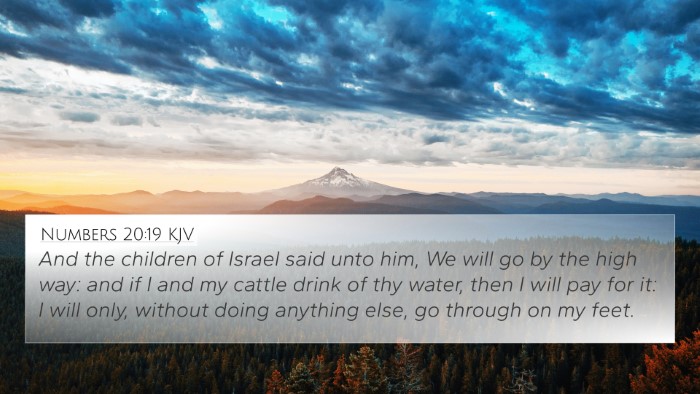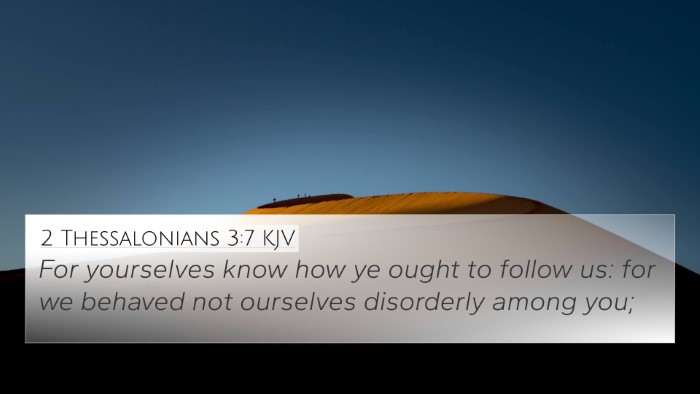Understanding Deuteronomy 2:6
Verse Reference: Deuteronomy 2:6 - "Ye shall buy meat of them for money, that ye may eat; and ye shall also buy water of them for money, that ye may drink."
Summary of Meaning
This verse is a part of the Israelites' journey through the wilderness as Moses recounts their experiences. In this context, it emphasizes the necessity of transactions for sustenance during their journey. The Israelites are instructed to engage economically with the various nations they encounter along the way, showcasing a practical approach to their needs.
Commentary Insights
- Matthew Henry: Henry highlights the cooperative nature of the Israelites' approach to acquire what they need. He emphasizes that the need for food and drink is made clear, underscoring that God's provisions come through ordinary means, and that the Israelites must humbly seek to procure what they require in their journey.
- Albert Barnes: Barnes points out that this verse reflects the principle of lawful commerce. The act of buying food and water shows respect for the local inhabitants. Barnes suggests that this indicates a broader principle: the necessity of seeking provisions through honest means and contributing to the economies of other nations as the Israelites pass through.
- Adam Clarke: Clarke elaborates on the transaction notion, mentioning that eating and drinking are fundamental human needs. He notes that this approach of buying rather than taking by force reflects the character of the Israelites under God's direction, reinforcing a message of peace and lawful conduct.
Connections Between Bible Verses
Deuteronomy 2:6 can be cross-referenced with several other Bible verses that illustrate similar themes of provision, necessity, and lawful conduct in interactions with others. Here are some notable references:
Bible Cross References
- Exodus 23:25: "And ye shall serve the LORD your God, and he shall bless thy bread, and thy water; and I will take sickness away from the midst of thee." This verse emphasizes God’s provision in response to faithful service.
- 1 Timothy 5:8: "But if any provide not for his own, and specially for those of his own house, he hath denied the faith, and is worse than an infidel." This highlights the necessity of providing for oneself and one’s family, linking to the theme of seeking provisions.
- Luke 10:7: "And in the same house remain, eating and drinking such things as they give: for the laborer is worthy of his hire. Go not from house to house." This illustrates the acceptable practice of receiving provisions through toil and gratitude.
- Philippians 4:19: "But my God shall supply all your need according to his riches in glory by Christ Jesus." A reminder of divine provision for needs aligns with the reliance illustrated in Deuteronomy 2:6.
- Matthew 7:7: "Ask, and it shall be given you; seek, and ye shall find; knock, and it shall be opened unto you." This verse conveys the idea of seeking out needs which can be connected to the act of purchasing necessities.
- John 6:35: "And Jesus said unto them, I am the bread of life: he that cometh to me shall never hunger; and he that believeth on me shall never thirst." This highlights spiritual nourishment as parallel to physical sustenance.
- Isaiah 55:1: "Ho, every one that thirsteth, come ye to the waters, and he that hath no money; come ye, buy, and eat; yea, come, buy wine and milk without money and without price." This echoes the theme of provision and God’s grace in offering sustenance even without cost.
Thematic Bible Verse Connections
The themes present in Deuteronomy 2:6 connect broadly to subjects of provision, sustenance, and interactions among nations:
- The theme of self-reliance in seeking provisions under God's guidance.
- The moral obligation of mutual respect in commerce and sustenance.
- The acknowledgment of human needs, leading to a communal approach in sustenance.
- Principles of ethical engagement with others in times of need.
- The interdependence highlighted through transactions and seeking assistance.
Tools for Bible Cross-Referencing
Cross-referencing Bible verses can enhance understanding and facilitate deeper study. Here are some tools and methods:
- Bible Concordance: Helps locate verses and see related themes.
- Bible Cross-Reference Guide: Provides structured connections between verses.
- Cross-Reference Bible Study: A methodical way to analyze connections across scriptures.
- Bible Reference Resources: Comprehensive databases assisting in theme identification.
- Bible Chain References: A system for exploring linked verses through thematic chains.
How to Use Bible Cross-References
When utilizing cross-references, it is essential to:
- Identify similar themes in scripture.
- Understand the context of each referenced text.
- Engage in comparative studies to deepen insights.
- Reflect on personal and collective applications of these themes.
Conclusion
Deuteronomy 2:6 serves as a reminder of the importance of seeking provision through lawful means and under God's guidance. By exploring its connections with other scriptures and employing cross-referencing tools, one can gain a richer understanding of the biblical narrative and its teachings regarding sustenance and ethical interaction.







